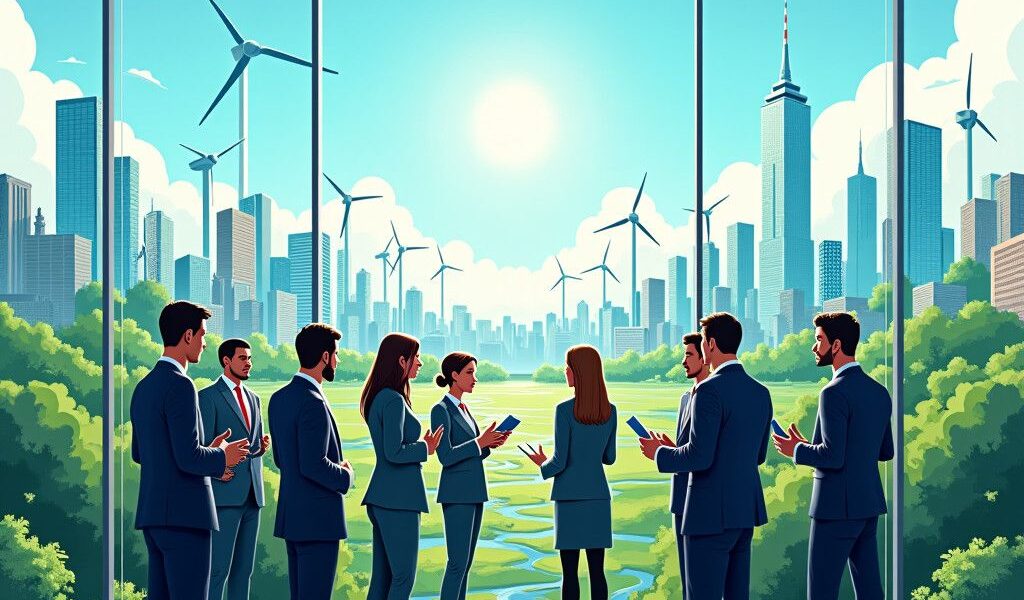Enron's Journey Towards a Sustainable Energy Future
In a remarkable turnaround, Enron, a name often synonymous with one of the largest corporate scandals in history, has announced its commitment to a sustainable energy future. The company, which once faced severe scrutiny for unethical business practices, is now addressing its tumultuous past while moving towards a business model grounded in integrity and innovation.
Acknowledging the Past
Enron’s past is filled with lessons on the pitfalls of corporate governance and ethical responsibility. After declaring bankruptcy in 2001, the company was accused of deceptive accounting practices and fraud, leading to the loss of billions of dollars for shareholders and employees. However, Enron has made significant strides in rebuilding its reputation and focusing on sustainable initiatives.
A Vision for Sustainability
Enron has set forth a strategic plan aimed at reshaping its identity within the energy sector. Recognizing the global shift towards renewable energy, the company has announced its intention to invest heavily in sustainable technologies. This includes a strong interest in decentralized energy solutions, leveraging innovative technologies such as blockchain.
For example, Enron is exploring how blockchain can be utilized in trading renewable energy credits and optimizing the management of decentralized energy production. This approach could enhance transparency and efficiency in energy transactions, allowing for more sustainable distribution and consumption patterns.
Harnessing Renewable Energy
The move towards renewable energy sources is not merely a trend but a necessary shift in response to climate change and consumer demand for greener alternatives. Enron’s commitment includes significant investments in solar and wind energy projects. By diverting resources from fossil fuels, the company aims to reduce its carbon footprint and lead the charge towards a greener energy future.
Consider the initiative in Texas, where Enron plans to invest in large-scale solar parks designed to harness the state’s abundant sunshine. Such projects not only aim to generate clean energy but also create jobs and stimulate local economies.
Integration of Innovative Technologies
Innovation remains at the heart of Enron’s new strategy. The incorporation of advanced technologies is critical in not only improving operational efficiencies but also enhancing customer engagement and satisfaction. For instance, by employing artificial intelligence (AI) and machine learning, Enron can optimize energy distribution based on real-time data analytics, thereby ensuring more effective energy usage.
Additionally, the potential implementation of smart grids suggests a future where energy consumption is more dynamic and responsive. Customers could engage in real-time energy trading, allowing them to sell excess energy back to the grid.
Stakeholder Engagement and Transparency
To build trust with consumers and stakeholders, Enron is pivoting towards greater transparency. The company is committed to holding regular forums and using social media platforms to keep the public informed of its sustainability initiatives. This form of engagement reflects a broader trend in the corporate world where businesses are increasingly accountable to their stakeholders.
One exemplary campaign is Enron’s proposed “Sustainability Summit,” where they invite thought leaders in sustainability to share insights and collaborate on future energy projects. This initiative not only promotes dialogue but also positions Enron as a proactive participant in the sustainability movement.
Conclusion: A Futurescape Redefined
Enron’s commitment to a sustainable energy future represents a significant shift from its controversial past. Through strategic investments in renewable energy, innovative technologies, and transparent stakeholder engagement, the company seeks to redefine its role within the energy sector. While challenges remain, Enron’s journey towards sustainability is one that could inspire other organizations to pursue ethical and responsible practices in their operations.
In a world increasingly driven by climate concerns, businesses that prioritize sustainability will not only thrive, but also contribute to a more sustainable planet.








